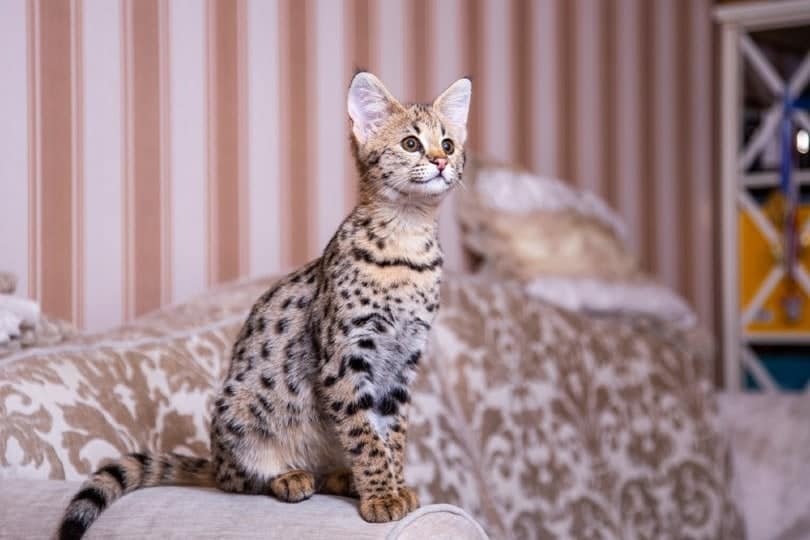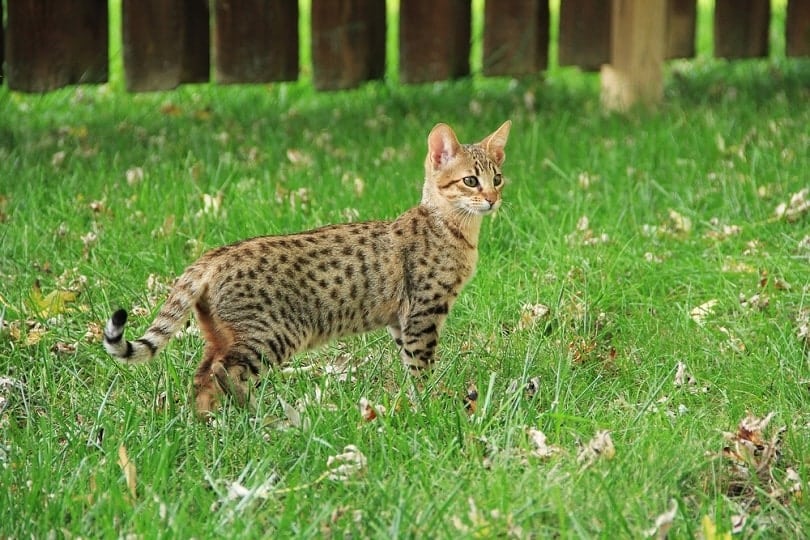
If you are longing to bring home a new cat but either suffer from cat allergies or live with someone who does, you may be on the search for a hypoallergenic cat breed. It’s easy to be drawn to the beautiful, majestic, and wild-looking Savannah cat, but are they a hypoallergenic breed?
First and foremost, it is important to note that there is no such thing as a fully hypoallergenic cat or dog. The term hypoallergenic was first coined in the 1950s as a marketing campaign referring to products that cause fewer allergic reactions.
There is some debate on whether the Savannah Cat produces fewer allergens, but they should not be considered hypoallergenic. We’ll take a closer look at the Savannah and the science behind cat allergies overall.
The Savannah Cat
The Savannah Cat is a hybrid cat breed that results from the cross-breeding of the wild African Serval and a domestic cat. Playful, adventurous, full of energy, and loyal, the Savannah is known for being more dog-like than cat-like. They are known for loving water and even do great with children and other pets.
First produced in the 1980s, this breed’s popularity soared quickly, and there are now breeders found all over the world. The Savannah Cat is categorized by generation and how close they are to their full-blooded serval ancestry.
Classification by Generation
Savannah Cats are categorized by how many generations they are removed from the African Serval. You will see a lot of Savannah cats labeled F1 through F8, with F8 being the furthest generation removed from the African Serval.
The “F” stands for filial generation, and the number stands for how many generations removed the cat is. The filial generation works independently from the lettering system A, B, C, and SBT. These letters are used by The International Cat Association (TICA) registration system to determine registration status.
A: One parent is a Savannah, and the other parent is either a serval or another domestic cat breed.
B: Both parents are Savannahs, but one grandparent is a different breed.
C: Both parents and grandparents are Savannahs, but at least one of the great-grandparents is of a different breed.
SBT: A cat that has SBT (Stud Book Traditional) in the registration code has at least three generations of Savannah-to-Savannah pairings within its pedigree. Only cats with F4 or later generations can be designated as SBT, and per TICA, Savannah Cats must be SBT to be shown in the championship class.

Savannah Cats and Allergy Sufferers
While all Savannah Cats will share some very similar traits, they will differ in looks and behavioral traits depending on how closely removed they are from the Serval. Because of their varying genetics and classifications, there is some confusion about the “hypoallergenic” status of the Savannah.
The wild Serval’s dander and coat are much different than those of domesticated cats, leading people to believe that Savannah’s should be considered a hypoallergenic cat breed. Breeders have reported that allergy sufferers have done better with Savannahs ranging between F1 and F3, which makes sense as these cats are closest to the Serval.
The Science Isn’t There…Yet
Currently, there are no scientific studies to say definitively that Savannah cats produce fewer allergens than your regular domesticated cat. That being said, there is some promising information coming from breeders and owners that leads some to conclude that the Serval relation does help in relation to allergies. It’s best to speak with your veterinarian or Savannah cat breeder if you have any questions or concerns.
Cat Allergies 101
Cat allergies are the most common pet allergy, being twice as common as dog allergies. A common misconception is that the allergy is directly related to the fur but the allergy stems from the proteins in the cat’s dander, saliva, and urine.
The allergic reaction is due to the immune system responding to the allergen. Your immune system produces antibodies to protect you from illness and infection. When allergies are present, the immune system views certain allergens as harmful, even though they are not, and reacts by producing antibodies against that particular allergen.

Symptoms of Cat Allergies
Symptoms of cat allergies may present differently by the individual. Symptoms can range from mild to severe and may even worsen over time:
- Sneezing
- Runny nose
- Itchy, red, or watery eyes
- Nasal congestion
- Itchy nose, the roof of the mouth, or throat
- Postnasal drip
- Cough
- Facial pressure and pain
- Trouble sleeping
- Swollen, blue-colored skin under your eyes
- In a child, frequent upward rubbing of the nose
- Difficulty breathing
- Chest tightness or pain
- Whistling or wheezing sound when exhaling
- Trouble sleeping caused by shortness of breath, coughing/wheezing
Diagnosis and Treatment
To confirm the presence of a cat allergy, allergy testing will need to be completed by your doctor. Once an allergy is confirmed, there are different treatment options available including medication, allergy shots, and keeping a distance from the allergen. You’ll want to speak to your doctor about the best course of action regarding treatment.
Conclusion
There is no such thing as a 100% hypoallergenic pet. Since Savannahs are a hybrid between the African Serval and domestic cat, they may produce fewer allergens thanks to their Serval relation. Savannah cats should not be considered hypoallergenic, however, since there are not yet confirmed studies proving they produce fewer allergens than other domestic cats.
Featured Image Credit: Shutterstock






